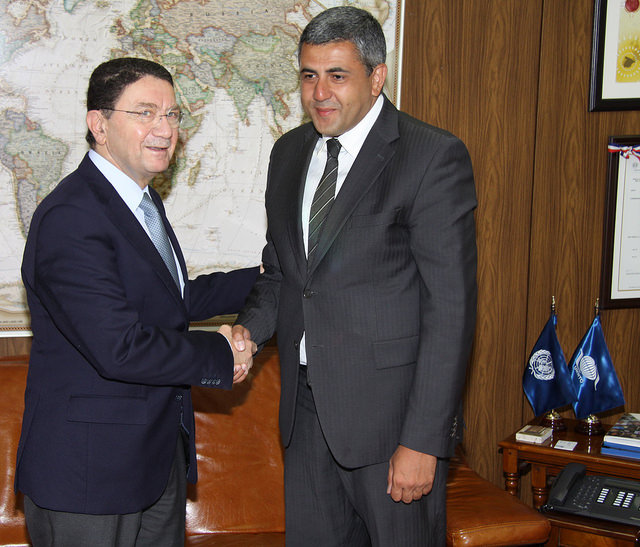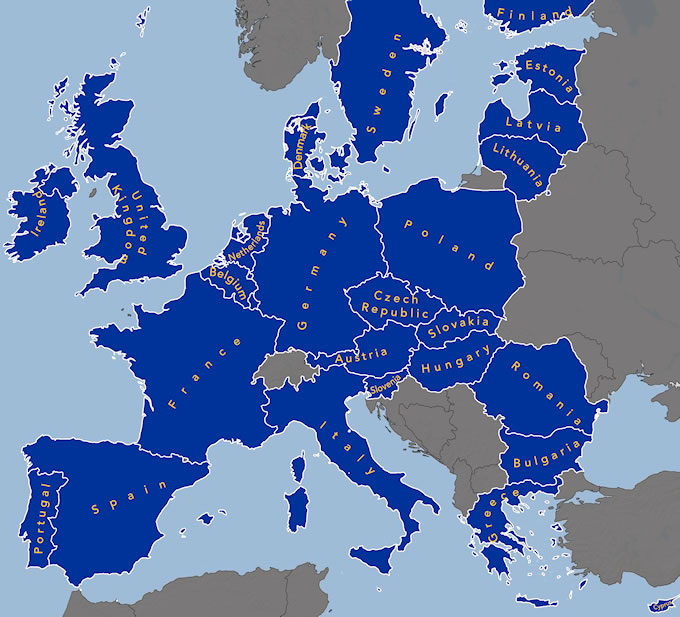

UNWTO presents the 3rd UNWTO World Forum on Gastronomy Tourism
The World Tourism Organization Headquarters in Madrid, Spain, hosted today the presentation of the 3rd UNWTO World Forum on Gastronomy Tourism. The event will be held in Donostia-San Sebastian, Spain, on 8-9 May 2017.
The Forum is organized by UNWTO in collaboration with UNWTO Affiliate Member, the Basque Culinary Center, as part of the activities of the UNWTO Gastronomy Network. The third edition will be dedicated to the links between gastronomy tourism and sustainability in the framework of the 2017 International Year of Sustainable Tourism for Development.
The first edition of the Forum took place in Donostia–San Sebastian, the second edition in 2016 in Lima, Peru, and in 2017 the Forum will return to Donostia–San Sebastian, where it is to be held every two years.
The presentation was attended by UNWTO Secretary-General, Taleb Rifai, the State Secretary of Tourism of Spain, Matilde Pastora Asian González; the Vice Councilor of Commerce and Tourism of the Basque Government, Isabel Muela; the Director of Tourism of the County Council of Gipuzcoa, Maite Cruzado and the Councillor of Donostia-San Sebastián, Ernesto Gasco and the Director General of the Basque Culinary Center, Joxe Mari Aizega.
“The relation between food and culture has become a major motivation for travelers, but also a great catalyst of sustainable tourism as gastronomy tourism brings out the most authentic features of each destination” said UNWTO Secretary-General, Taleb Rifai at the presentation of the Forum.
“Gastronomy tourism has an immense potential and is a priority for Spain’s tourism promotional strategy due to its increasing relevance, particularly in rural destinations. In 2015, 8.4 million international tourists, representing 12.3% of the total, engaged in some activity related to gastronomy” said Matilde Pastora Asian González, Secretary of State for Tourism of Spain.
The event will bring together leading experts in gastronomy tourism to discuss latest trends and to share case studies and innovative products. Topics will include the so-called ‘farm to table’ processes, sustainable product development, successful public policies and the benefits of gastronomy tourism.
“Gastronomy tourism is a flourishing phenomenon and our objective is to create a space to share, to reflect, to analyze and to work to improve tourism in this area” said Joxe Mari Aizega, Director General of the Basque Culinary Center.
The panel presentations will be complemented by working sessions giving all participants the opportunity to interact and share ideas. Parallel to the official programme of the Forum, a wide range of events will be conducted at a number of gastronomic hubs showcasing the rich variety of products offered.
On the occasion of the Forum, UNWTO will release the second volume of the Global Report on Gastronomy Tourism. The publication analyses current trends in gastronomy tourism and the methodologies involved in product development.
Additional information:
3rd UNWTO World Forum on Gastronomy Tourism website

Georgia reveals multi-step plan for UNWTO’s future
Georgia wants to become the new leader of the United Nations World Tourism Organization. The current UNWTO Secretary-General Taleb Rifai will resign in 2017 and so far two candidates came forward wanting to take over the top post he had held for 8 years.
One candidate is from Georgia. He is H.E. Mr. Zurab Pololikashvili, Ambassador of Georgia to the Kingdom of Spain, Permanent Representative of Georgia to the World Tourism Organization (UNWTO). He laid out his plan for the future of UNWTO under his proposed leadership.
Statement of Intent and Management
The World Tourism Organization (UNWTO) has become an efficient platform providing leadership, guidance and support to the tourism sector in advancing knowledge and tourism policies worldwide.
Tourism has become the stepping-stone of nations’ economies and has turned into an effective mechanism to fight poverty around the globe. The sector has transformed cultural differences into alliances and has opened opportunities, assumed to have been gone forever.
With the rapid development of the tourism industry, it is of utmost importance for member states, associate and affiliate members, and the UNWTO overall, to maintain a commitment to sustainability and competitiveness. Looking to the future, we have to understand that the choices our nations make today will undoubtedly affect future generations. This is a responsibility that the UNWTO has proudly upheld for numerous years, and will continue to pursue.
Considering the aforementioned and building on the tremendous success of the organization, it is time to usher in a new era of applied initiatives. The UNWTO will put emphasis on concrete projects with tangible outcomes to further support its members in an era of innovation, knowledge-sharing, and entrepreneurship.
FUTURE OPPORTUNITIES AND STRATEGIC CHANGES
The UNWTO has become a staple of success in the tourism sector; the organization has paved the way for achievements of numerous nations, organizations and consequently people. The success stories of the organization have raised its visibility and importance throughout the world as well as increased awareness of its actions, while higher demand for support from the organization has led to increased functions.
Looking ahead, it should be our priority to pursue result-oriented changes and innovations and ensure that the UNWTO further rises to the challenges that countries face on national, regional and global levels.
The tourism sector is changing dynamically; today we are faced with social and cultural phenomena, which are re-shaping the industry, and it is important that we further understand and adapt to these changes. New challenges require new approaches and the UNWTO has to adjust to the upcoming encounters.
In this light, strategic changes need to be implemented on four fronts of the organization:
- Internal
- External
- Socio-economic
- Sustainability.
The aforementioned four undertakings will bring the UNWTO and the tourism industry to new heights of progress, achievement, and visibility.
INTERNAL SHIFTS
Considering that the UNWTO will be moving into a new era of more flexible and pragmatic implementation of projects, the internal workings of the organization will need to focus on the same goals.
The organization will adopt a new dynamic approach to implementing projects and supporting nations on a practical level. With this, the internal staff, alongside their existing tasks, will follow the new goal of helping member states, associate, and affiliate members to learn and take advantage of the offering that the UNWTO presents.
With this, the agenda and work-flow of the UNWTO will also be expanded to further support the aforementioned mission.
EXTERNAL ADJUSTMENTS
The UNWTO will be undertaking a new feat of supporting countries not just on the national and regional level, but will become more approachable to provide guidelines on management and marketing for different types of tourism destinations in order to ensure further growth and competitiveness.
The organization will consequently become a reference point for destination marketing and management organizations, both on national as well as local level.
With this, the UNWTO will continue to support the implementation of the Global Code of Ethics for Tourism, the prime principles to encourage tourism’s socio-economic contribution and manage possible impacts, and achieving the Sustainable Development Goals (SDGs).
SOCIAL PERSUASION AND SOCIO-ECONOMIC BENEFITS
Within the most recent years, it has become abundantly clear that apart from its direct economic benefits, the tourism sector can serve as an applied and effective mechanism in the fight against poverty worldwide; it has the capability and potential to empower communities and restore hope to those most in need.
In this light, it is our inherent and unwavering priority to continue on this path, to raise social awareness about tourism, persuade communities about the potential of the sector and assist their empowerment.
SUSTAINABILITY
Sustainability and protection of the environment have long been at the center of the work of the UNWTO. We have had success with reshaping the 10-Year Framework Program activities to support sustainable policies, actions and practices. Now that we have the Sustainable Development Goals (SDGs) approved, it marks another substantial step forward.
Although we have had considerable achievements, the issue of sustainable development remains a concern. We have to achieve a higher level of understanding of sustainability and have to exemplify that development is not hindered by sustainable practices or policies and that without sustainability at its core, no development is worth the tradeoff.
In order to achieve the aforementioned strategic objectives, I have identified seven priority issues which will become the focal points of my vision for the next four years.
1. Benefits for the member states, associate and affiliate members
Within the past decade the UNWTO has grown both in popularity and in members. Today, the organization unites 157 countries, 6 associate members and over 500 affiliate members. These members represent the diversity of ideas, resources, challenges and successes of the organization.
Focusing on member states, it is particularly important to understand that nations at various levels of development with regards to the tourism industry are sometimes faced with similar challenges.
Even in cases when challenges posed might be similar or relevant to a group of nations, the solutions presented in each country might be fundamentally different. To this point, the UNWTO needs to dive deeper and identify not only similar challenges; but cases where similar challenges have been resolved in similar environments; thus, presenting nations with the guidelines of practical steps to be undertaken to overcome their barriers.
In order to achieve this goal, alongside the UNWTO, affiliated members of the organization will play a key role thanks to their knowledge, research and practices.
By emphasizing the pragmatic benefits of UNWTO membership, the organization will be able to continue its growth in terms of members and uphold its key role as the frontrunner for tourism.
2. Continued integration with the United Nations
We have seen continued integration of the UNWTO with the agenda of the United Nations; this is a tremendously important process, as it provides the opportunity to present the key concerns, vision and sustainability initiatives on the world platform.
With this, the celebration of 2017 as the International Year of Sustainable Tourism for Development has to be viewed as one of the key successes for the industry and the UNWTO. It truly outlines the scope of the sector and will further raise awareness about possibilities and advancements, within the UNWTO, member states, and associate and affiliate members.
With this, we have to consider the unfortunate fact that in today’s world tourists need to be more wary of their travel environment. This is the reason why the UNWTO needs to continue its work to promote safe and seamless travel, and especially elevate its efforts with the United Nations Office on Drugs and Crime (UNODC). This will further support the integration of tourism into the emergency and security mechanisms; supporting safer and more secure travel practices across the globe. The UNWTO also need to continue supporting initiatives such as the joint campaign “Your Actions Count – Be a Responsible Traveler” launched in 2014, which supported the fight against illegal trafficking in its various forms and relevant issues.
Alongside other undertakings, we have to once again focus on pragmatic projects, and I truly believe that the declaration of 2018 as the European Year of Tourism and Cultural Heritage, and similar initiatives that involve concrete benefits, value and support, are the types of activities that will bring forward new successes for the UNWTO.
3. Enhancements in technology and its effects on tourism
We have to take into account continuous and dynamic development of technology in tourism. This process will only accelerate in the future, and as social behavior follows new trends, we will be faced with a new playfield. I strongly believe that cooperation and knowledge sharing is the only way we will have an opportunity to better understand the future travel behaviors and patterns.
The technology of today is already driving masses to new destinations, sometimes to places rarely explored by travelers, thus we have to seize this opportunity and create new destination management and marketing models to take advantage of these new platforms and support competitiveness, rather than dismissing their impact.
4. New dimension of support on local level
We are more aware of tourism’s effects and relations to other sectors than we have ever been before. We understand the delicate cohesion between local level destination marketing and management to the overall success and development of the tourism industry in nations. We are aware of the particularities and challenges of various destinations, and at the same time, we understand the reasoning behind successes and “best practices” of other destinations.
Considering the aforementioned, we need to enter a new phase of analyzing local level destination marketing and management practices. The UNWTO will not only focus on nations’ competitiveness regionally and globally, but will also have to place emphasis on local-level development. The UNWTO’s key role in this regard will be to analyze similar local level destination cases, not only in terms of successful practices, but also by identifying success stories in similar economic, social, environmental and tourism development level cases.

ICTP Chairman: Today we are all Berliners!
Juergen T. Steinmetz, chairman of the International Coalition of Tourism Partner issued the following statement:
“Yesterday we were all Jordanians, today we’re all Berliners.”
On behalf of the International Coalition of Tourism Partners, I would like to extend our sympathy and condolences to the victims and their loved ones involved in yesterday’s criminal attack in Jordan, and today in Berlin. Both incidents were senseless acts by disguised criminals aimed to disable the world’s largest industry: Travel and Tourism.
It took heroes like Jordanian law enforcement to prevent more harm, and it will take all of us, our community of travel and tourism professionals, to take leadership and encourage our clients and the public to consider traveling to amazing places including Berlin, Jordan, Egypt, Istanbul, Brussels, Nice, Paris, Kenya, Tunisia, and New York.
You may not see this in the headlines, but everything possible is being done in these great destinations and most other parts of the world to keep travelers safe.
Terror attacks make headlines, but we should not forget the proportion of criminal incidents a tourist could fall victim to, compared to a billion people traveling each year. The world, including those places that had been randomly hit by widely-publicized headlines, are safe and will remain safe.
In other places, criminal acts are becoming routine. Dozens are getting killed in Chicago every week by gunshots, and yet tourism, meetings, and conventions in the Windy City are booming.
Don’t let a handful of fanatics and criminals alter our way of life. Travel and Tourism is a contributor to peace and understanding. Travel and Tourism translate to jobs and prosperity for 10% of the world’s population. This makes our industry one of the largest economic players. Travel and Tourism must and will remain resilient.
Berlin is a great city, and Germany will remain a welcoming country and a model for this troubled world. Islam is a peaceful religion. The same counts for Christianity, Judaism, Hinduism, Buddhism. Not believing in a particular God, doesn’t mean believing in doing harm.
However, if you think hate and corporal punishment and randomly killing children, tourists, and old people attending a Christmas Market will get you to Heaven or Nirvana or the like, you will be in for a terrible reality. The reality is you are simply a criminal, and disrespectful of human life.
President Kennedy once said: “We are all Berliners!” And this becomes a true statement once again today.
The International Coalition of Tourism Partners (ICTP) is a grassroots Travel & Tourism coalition of destinations and stakeholders.
Green Growth + Quality = Business
For more information on ICTP and how to join members in 131 countries without any cost, please visit ictp.travel

UNWTO strengthens its relationship with the European Union
During a recent visit to Brussels, Belgium, the Secretary-General of the World Tourism Organization (UNWTO), Taleb Rifai, has discussed how to reinforce the collaboration of the Organization with the European Union (EU).
Rifai met the EU Commissioners for Education, Culture, Youth and Sports, Tibor Navracsics; for Environment, Maritime Affairs and Fisheries, Karmenu Vella; and for International Cooperation and Development, Neven Mimica. Issues such as the links between culture and tourism, the EU Blue Growth Agenda, namely in the areas of oceans and biodiversity, the 2017 International Year of Sustainable Tourism for Development and the Sustainable Tourism Goals (SDGs) were in the agenda.
During the visit, Rifai also met the Deputy-Prime Minister of Belgium, Kris Peeters, and, Ben Weyets the Flemish Minister of Mobility and Public Works, the Vlaamse Randa, Tourism and Animal Welfare. Under the auspices of Minister Weyets, UNWTO signed an agreement with the Flanders Department of Foreign Affairs to jointly develop a set of guidelines for tourism on war-related historical sites.
UNWTO welcomes EU-China Year of Tourism
Rifai has also welcomed the EU-China Year of Tourism during his recent participation at the 1st anniversary of the Europe China OBOR Culture & Tourism Development Committee of the Europe-China One Belt One Road initiative.
The event held in Brussels, Belgium, stressed the relevance of tourism and culture in strengthening the links between the European Union and China.
“The Committee works to ensure that the tourism sector within the European Union responds with a unified voice to the immense potential of the Chinese tourism market and the One Belt One Road initiative, one of the largest ever investment plans. The support of UNWTO to the Committee and to the EU-China Year of Tourism in 2018 is of critical value” said István Ujhelyi, President of the Committee.
On the occasion of his visit to Brussels, Rifai also signed an agreement with the Network of European Regions for Competitive and Sustainable Tourism (NECsTouR) to work on several issues including the promotion of the International Year of Sustainable Tourism for Development 2017.
“Bearing in mind UNWTO and NECSTouR common priorities and considering the fruitful cooperation between our organizations, including NECSTouR intention to join UNWTO as an Affiliate Member, this agreement is a natural step. We trust it will generate many valuable opportunities” said the President of NECSTouR, Octavi Bono.
